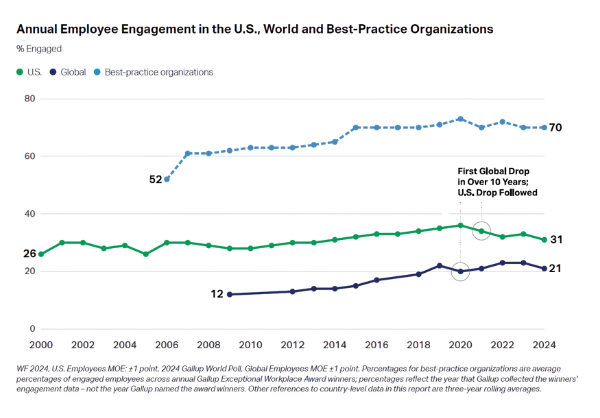Gallup’s State of the Global Workplace: 2025 report captures a global workforce grappling with disconnection, declining wellbeing, and the pressures of adapting to a rapidly transforming digital landscape. As artificial intelligence reshapes the workplace, the report identifies a profound gap between leadership expectations and employee realities, with managers, the linchpins of engagement, most severely affected.
According to Gallup’s global survey of employee experience, engagement has fallen to 21% while thriving life evaluations dropped to 33%. With only 27% of managers engaged, and female and young managers facing the steepest declines, the cascading impact is felt across productivity, team morale, and organizational resilience.
Why It Matters: Gallup estimates that a fully engaged global workforce could add $9.6 trillion in productivity, equivalent to 9% of global GDP. The findings reveal a critical opportunity for executive leaders: invest in management development or risk a continued decline in workforce performance, wellbeing, and profitability.
- Manager Engagement Drives Team Outcomes and It’s Crumbling: One of the most alarming findings in the report is the significant decline in manager engagement, falling from 30% in 2023 to 27% in 2024. This drop is especially stark among young managers under age 35 (−5 percentage points) and female managers (−7 points). Since Gallup research shows that managers are responsible for 70% of the variance in team engagement, this disengagement creates a domino effect: less motivated teams, decreased productivity, and a weakening of overall organizational culture. Without intervention, this downward spiral could severely damage business performance across industries.
- Wellbeing is Declining, Especially Among Managers and It’s Not Just About Work: While individual contributors’ life evaluations held steady or improved slightly, managers’ wellbeing declined notably. Older managers reported a 5-point drop, while female managers saw a 7-point decrease. Gallup attributes this not just to work-related stress but to broader life dissatisfaction, exacerbated by post-pandemic fatigue, inflation, and increasing demands on middle management. The report reinforces the close link between engagement and wellbeing: engaged employees are far more likely to be thriving in life, whereas disengaged workers experience higher rates of stress, sadness, and burnout. The implication is clear: improving workplace engagement is a necessary precondition for reversing the global mental health crisis.
- Negative Emotions Are Becoming a Norm, Especially in Remote and Hybrid Workplaces: Forty percent of global employees report feeling stress “a lot of the day,” along with high levels of sadness (23%), loneliness (22%), and anger (21%). These emotional indicators reflect a workplace environment that increasingly struggles to meet human needs for connection, purpose, and support. Remote work, while valued for its flexibility, correlates with higher loneliness (27% for exclusively remote workers) and sadness, suggesting that digital communication alone cannot replace the social fabric of in-person teams. Gallup’s findings warn that without rehumanizing work, especially for those in distributed roles, negative emotions may become embedded in daily life.
- Stark Regional Differences Highlight Cultural and Economic Fault Lines: Employee engagement rates vary dramatically across regions, with Europe at the bottom (13%) and the United States and Latin America tied for the highest (31%). Life evaluation data is similarly polarized: Australia and Latin America lead with 56% and 54% of workers thriving, while only 15% in South Asia and 18% in Sub-Saharan Africa say the same. These disparities reveal how economic conditions, public infrastructure, leadership practices, and cultural values shape the employee experience. For global organizations, this means engagement strategies must be tailored, a one-size-fits-all model will fall short in an increasingly complex world.
- Gallup’s Three-Part Solution: Manager Development as a Global Imperative: The report lays out a clear, data-backed strategy for reversing the engagement crisis. First, it urges organizations to provide role clarity and foundational training for all managers, something fewer than half currently receive. This alone can halve rates of active disengagement. Second, Gallup advocates teaching managers to be effective coaches, not just taskmasters; doing so improves both their own performance (by up to 28%) and that of their teams. Lastly, ongoing development, especially when combined with mentorship or encouragement, can boost a manager’s sense of thriving by over 30 percentage points. Together, these interventions form a powerful playbook for transforming organizations from the inside out.
Go Deeper -> State of the Global Workplace: 2025 Report – Gallup






